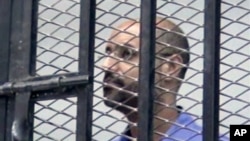The trial in Libya of Saif al-Islam Gadhafi, the son of former strongman Moammar Gadhafi and 36 other members of his regime, failed to live up to international standards of fairness, a United Nations report said Tuesday.
The trial was a major effort by the Libyan judiciary to hold people accountable for crimes, including grave violations of human rights during the 2011 revolution, which toppled former dictator Moammar Gadhafi.
But in the end, the U.N. report determined the trial did not do what it was meant to do. The report calls the trial procedure flawed and unfair. For example, the report says defendants were held incommunicado for prolonged periods and allegedly were subjected to torture — charges that were never investigated.
The report says lawyers complained they were unable to meet their clients in private and had difficulty accessing documents. The U.N. High Commissioner for Human Rights' representative in Libya, Claudio Cordone, says each defendant was limited to two witnesses.
Speaking by telephone from Doha, he says the trial missed the opportunity to provide an historical record of the conduct of the defendants and the regime during the revolution.
"Had the evidence been produced in court and given, in particular, that the trial was broadcast live — which is actually a welcome development — it would have given an opportunity for Libyans and everybody else to hear what exactly had happened or what, at least, these people were being accused of. But that, unfortunately, did not take place," Cordone said.
Libya does not allow for a full appeal, but only cassation — that is, a review of certain points of law. Nine of the defendants were given the death penalty, including Saif al-Islam Gadhafi, who was tried in absentia and sentenced in July 2015.
Among its recommendations, the report calls for a moratorium on the death penalty. It also urges all defendants be held in facilities under government control. Currently, the defendants are being held by the country's armed groups.









